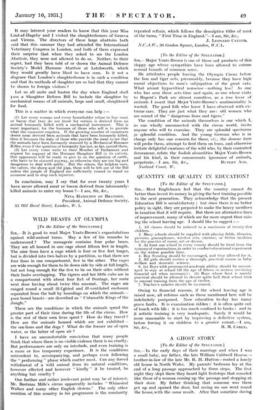QUANTITY OR QUALITY IN EDUCATION?
[To the Editor of the SPECTATOR.]
Sm,—Most Englishmen feel that the country cannot do better than invest its money in giving the best training possible to the next generation. They acknowledge that the present Education Bill is unsatisfactory ; but since there is no better policy in sight, they are prepared to make the heavy sacrifices in taxation that it will require. But there arc alternative lines of improvement, many of which arc far more urgent than rais- ing the school leaving age. I should like to suggest :-
l. All classes should be reduced to a maximum of twenty-five children.
2. Many schools should be supplied with playing fields, libraries, pictures, gramophones, wireless sets, cinemas, or better facilities for the practice of music, art or drama.
3. At least one school in every county should be freed from the tyranny of examinations, in order to conduct educational experiment on the widest possible lines.
4. Boy Scouting should be encourager], and time allowed for it. 5. All girls should receive a thorough, practical course in baby welfare and domestic science.
8. (a) Boys with pronounced academic ability should be encour. aged to stay at school till the age of fifteen or sixteen (receiving financial aid when necessary) ; (5) Boys whose bent is mainly practical should be allowed to devote quite half their school time to manual training from the age of twelve.
7. Teacher's salaries should be increased.
Owing to financial reasons, if the school leaving age is raised now, all reforms such as those mentioned here will be indefinitely postponed. Now education to-day has many grave faults. It is examination ridden : it is often quite out of touch with life : it is too much confined to books : and in it artistic training is very inadequate. Surely it would be more reasonable to start by improving a defective system, before forcing it on children to a greater extent. —I am,


































 Previous page
Previous page